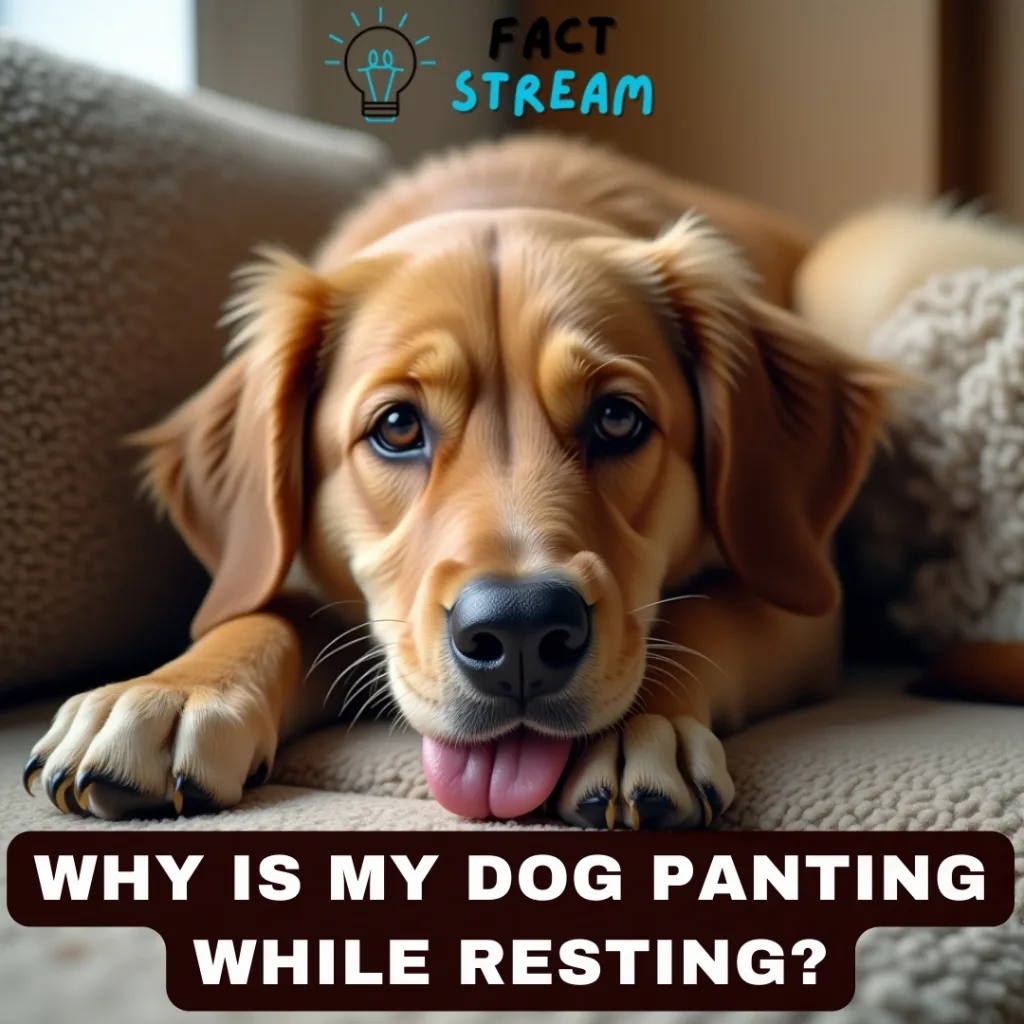Why is My Dog Panting While Resting?
Dogs pant. It’s normal! They especially pant after playing or going for a walk. But if your dog is panting a lot even when they are resting, it might be a sign something is wrong. This article will help you understand why your dog might be panting while resting and when you should call your vet.
What is Panting?
Panting is how dogs cool down. Unlike people, dogs don’t sweat much. They pant to get rid of extra body heat. Think of it like their own built-in air conditioner!
A normal breathing rate for a dog is about 15 to 35 breaths every minute when they are resting. But some dogs with flat faces, like Pugs and Bulldogs, have a harder time breathing and might pant more than other dogs.
Reasons Your Dog Might Be Panting While Resting
Here are some common reasons why your dog might be panting even when they are relaxed:
1. They’re Hot!
This is the most common reason dogs pant. If it’s warm outside or your dog has been playing, they’ll pant to cool down. Make sure your dog has plenty of fresh water and a cool place to relax.
2. Heatstroke
Heatstroke is very dangerous! It happens when a dog gets too hot and their body can’t cool down. This can happen even on days that aren’t super hot if your dog is playing a lot and doesn’t have shade or water.
Here are some signs of heatstroke:
- Panting a lot
- Their eyes look glassy
- They seem weak or tired
- Their heart is beating very fast
- Drooling more than usual
- Seizures
- Throwing up
- Diarrhea
- Their body temperature is over 104 degrees Fahrenheit
If you think your dog has heatstroke, do these things:
- Move your dog to a cool place right away.
- Help them cool down by:
- Putting them in cool (not cold) water.
- Putting cool, wet towels on their chest, neck, and head.
- Give them cool water to drink or ice cubes to lick.
- Take them to the vet immediately!
How to Prevent Heatstroke:
- Never leave your dog in a parked car, even for a few minutes. Cars heat up very quickly!
- Always make sure your dog has shade and water when they are outside.
- Don’t make your dog exercise too much on hot days.
3. They’re Sick
Sometimes, panting when resting means your dog isn’t feeling well.
Here are some health problems that can cause panting:
- Heart problems: Like humans, dogs can have heart problems. This could be a weak heart, heartworms, or other heart conditions. These problems make it hard for the heart to pump blood properly.
- Lung problems: When a dog has lung problems, it’s hard for them to breathe. This could be from an infection like pneumonia, lungworms, or even lung cancer.
- Cushing’s disease: This is a problem where the dog’s body makes too much of a hormone called cortisol. This can make them pant, drink a lot of water, pee a lot, lose hair, and have a big belly.
- Pain: Dogs can’t tell us when they’re in pain, so panting might be their way of showing us. Pain can be from an injury, arthritis, or other problems.
- Anxiety: Dogs can get anxious, too! Panting is a common sign of stress or fear in dogs.
4. Other Reasons
Here are a few more reasons why your dog might be panting:
- Medicine: Some medicines can make dogs pant more.
- Eclampsia: This is a problem that mother dogs can have after giving birth. It makes them pant, shake, and have trouble walking.
- Allergies: Allergies can make it hard for dogs to breathe, just like in people.
- Obesity: Overweight dogs have to work harder to breathe and might pant more.
When to Call the Vet
If your dog is panting a lot while resting and you don’t know why, it’s always best to call your vet. They can help figure out what’s wrong.
Take your dog to the vet right away if they:
- Can’t get comfortable or lie down
- Are pacing around and can’t relax
- Seem very tired or weak
- Are about to faint or collapse
- Are standing with their neck stretched out
- Their gums are blue, purple, gray, or white instead of pink
- Their belly is swollen
- Have fluid coming out of their mouth or nose
- Have yellow or green stuff coming out of their eyes or nose
- Stop eating
- Are throwing up or having diarrhea
It’s also a good idea to call your vet if your dog’s panting is:
- Sudden
- Louder or sounds different than usual
- Happening while they’re resting or sleeping
- Accompanied by drooling more than usual
- Making it hard for them to breathe
What the Vet Will Do
Your vet will check your dog all over to try to figure out why they are panting. They will listen to their heart and lungs. They will also ask you about your dog’s history and if anything has changed with their behavior.
Your vet might need to do some tests, like:
- X-rays: These pictures can help the vet see if there’s a problem with your dog’s lungs or heart.
- Blood tests: These tests can tell the vet if your dog has an infection or other problem with their blood.
- Heartworm test: This test can tell the vet if your dog has heartworms, which are little worms that live in the heart.
- Other tests: Your vet might need to do other tests depending on what they think is wrong with your dog.
How to Treat Panting
The way the vet treats your dog’s panting depends on what is causing it. They might give your dog:
- Medicine: Different medicines can help with different problems, like infections, pain, or heart problems.
- Oxygen: If your dog is having trouble breathing, the vet can give them extra oxygen to help.
- Surgery: Sometimes the vet needs to do surgery to fix a problem, like a tumor or a heart problem.
- Other treatments: The vet might do other things to help your dog feel better, like giving them fluids if they’re dehydrated or helping them learn to relax if they’re anxious.
It’s very important to do what the vet tells you to do to help your dog get better.
Important Things to Remember
- Panting is normal for dogs, but if it’s excessive or your dog is panting while resting, it’s important to talk to your vet.
- There are many reasons why a dog might pant, and some of them can be serious.
- Early diagnosis and treatment are very important for your dog’s health!
Always ask your vet if you have any questions about your dog’s health!


